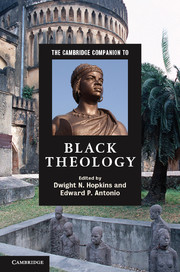Book contents
- Frontmatter
- Part I Introduction
- Part II Themes in black theology
- 6 God
- 7 Jesus in black theology: the ancient ancestor visits
- 8 Black theology and the Holy Spirit
- 9 Black theology and human purpose
- 10 Theology's great sin: silence in the face of white supremacy
- 11 Theodicy: “De Lawd knowed how it was.” Black theology and black suffering
- 12 Black theology and the Bible
- 13 Protestant ecclesiology
- 14 Roman Catholic ecclesiology
- 15 Dignity and destiny: black reflections on eschatology
- Part III Global expressions of black theology
- Further reading
- Index
- Other titles in the series
15 - Dignity and destiny: black reflections on eschatology
from Part II - Themes in black theology
Published online by Cambridge University Press: 28 September 2012
- Frontmatter
- Part I Introduction
- Part II Themes in black theology
- 6 God
- 7 Jesus in black theology: the ancient ancestor visits
- 8 Black theology and the Holy Spirit
- 9 Black theology and human purpose
- 10 Theology's great sin: silence in the face of white supremacy
- 11 Theodicy: “De Lawd knowed how it was.” Black theology and black suffering
- 12 Black theology and the Bible
- 13 Protestant ecclesiology
- 14 Roman Catholic ecclesiology
- 15 Dignity and destiny: black reflections on eschatology
- Part III Global expressions of black theology
- Further reading
- Index
- Other titles in the series
Summary
INTRODUCTION
In this chapter, I will attempt to present my version of the meaning of eschatology. The views presented here are personal. They are, at the same time, the reflections of a person who has been in the black context for several decades. My witness in the church and the academy has been universal. Here, my focus is from the black experience; it is therefore delimited. I also speak from my development of a program of black theology.
The study of my life is forthcoming in a work titled, Seasons of Life. What I have to say here is a brief account.
I was born in the southern United States (in North Carolina, 1927), and my education (up to the Bachelor of Divinity degree) was obtained in this state. This is likewise the state where I pastored my first church. Educated at Johnson C. University (BA) and Shaw University (BD), I led the Union Baptist Congregation at Tarboro, North Carolina.
My next challenge was as assistant pastor of the Union Baptist Church in Hartford, Connecticut, where I obtained the STM (or Master of Sacred Theology degree) in philosophy of religion. During the Hartford period I was a part-time migrant minister to black, Jamaican, and Puerto Rican migrants.
- Type
- Chapter
- Information
- The Cambridge Companion to Black Theology , pp. 211 - 220Publisher: Cambridge University PressPrint publication year: 2012



